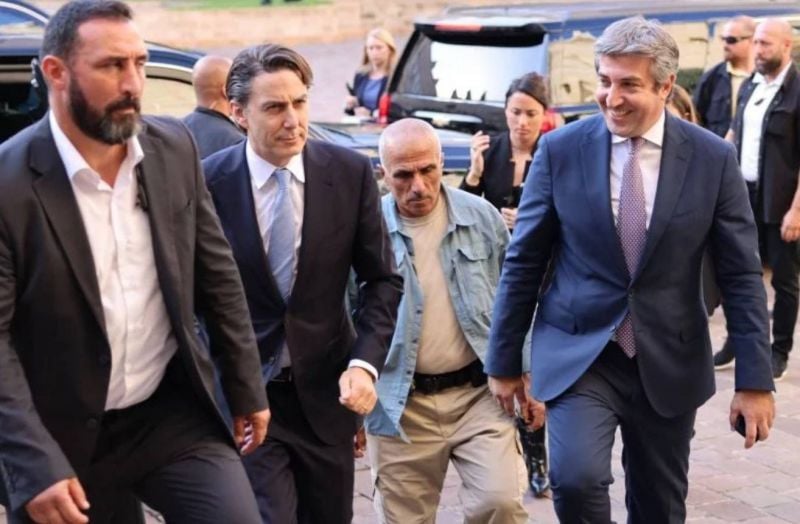
American envoy Amos Hochstein arrives at the Grand Serail in Beirut to meet with outgoing Prime Minister Najib Mikati. (Credit: Joseph Eid/AFP)
US Special Envoy Amos Hochstein has returned to Beirut. This news was the talk of the town in Lebanon on Tuesday. Hochstein’s brief impromptu visit to Lebanon was made at a particularly tense time, while clashes between Hezbollah and Israel in the south keep pace with the Hamas-Israel war.
Faced with the risk of escalation, the Lebanese authorities have repeatedly reiterated their commitment to stability and to the implementation of UN Resolution 1701, to prevent an open war that would destroy the country.
This is where Hochstein stepped in. President Joe Biden’s envoy held talks with Parliament Speaker Nabih Berri, caretaker Prime Minister Najib Mikati, Army Chief Joseph Aoun and former General Security Chief, Gen. Abbas Ibrahim, who is reputed to be close to Hezbollah.
Hochstein’s visit aimed to contain the escalation and send messages to Hezbollah and by extension, to Iran.
‘The US does not want to see conflict escalating’
Hochstein, who played a key role in the maritime border demarcation agreement signed in October 2022 between Lebanon and Israel, visited Beirut in September. As the Special Presidential Coordinator for Global Infrastructure and Energy Security, Hochstein’s main concerns are oil, gas and energy issues. During his last visit, he raised the sensitive issue of land border demarcation.
Hochstein’s visit is therefore all the more important given the various messages it carries. Washington believes the developments in southern Lebanon, the area from which Hezbollah and Palestinian factions in Lebanon are carrying out attacks on Israel, are a violation of Resolution 1701, which put an end to the July 2006 war between Hezbollah and Israel and provided for the deployment of the Lebanese Army at the border.
“The United States does not want to see conflict in Gaza escalating and expanding into Lebanon,” said Hochstein on Tuesday after his meeting with Berri. “Restoring calm along the southern border is of utmost importance to the United States and it should be the highest priority for both Lebanon and Israel,” he added.
During his meeting with Berri, Hochstein offered his condolences for the death of the four civilians that were killed on Sunday in southern Lebanon in an Israeli strike, and called for avoiding a dangerous escalation involving Lebanon.
“The Americans said they were putting pressure on the Israelis to achieve a ceasefire,” said a source familiar with the discussions.
Mikati stressed in a press statement that Hochstein, “the US President’s envoy for Lebanon,” expressed his commitment to Resolution 1701. “Efforts are underway to obtain a humanitarian truce in Gaza,” Mikati stated.
Hochstein insisted on the need to prevent escalation in the South to promote stability, said the aforementioned source.
“In this context, he [Hoschstein] stressed the role that Beirut could play in the political resolution of the conflict, which would constitute the starting point for any discussions on the release of [Israeli] hostages in exchange for Palestinian prisoners, thus contributing to the efforts for a humanitarian truce,” said the source.
The presidential dossier and the land border demarcation were also discussed.
Realistic approach
“The United States is using all its cards and all its contacts in the region to prevent the situation from spinning out of control,” said a Western diplomatic source.
Many US officials are present in the region and engaged in communication with local parties in hopes of reaching a political agreement.
Hochstein’s visit cannot be separated from last week’s meeting between Mikati and US Secretary of State Antony Blinken.
However, observers believe Hochstein and Blinken are not necessarily on the same wavelength. While the latter has openly displayed his overtly pro-Israeli positions, Hochstein is a realist with more experience on the ground. Hochstein is aware of Iran’s key position in the region, particularly in Lebanon.
Hochstein’s visit consisted in part of indirect negotiations and exchanges with Hezbollah, through the officials he met with. Even before he arrived in Beirut, the envoy had several contacts with various Lebanese players, as well as with Qatari leaders, who are playing a key role in efforts to de-escalate the situation in Gaza and with whom he has built up good relations, particularly after the maritime border agreement of Oct. 2022.
“Amos Hochstein has been collecting comments and observations on US policy since the start of the war in Gaza, from both the Qatari and Lebanese sides. He is also working hard to prepare the ground for new discussions on the land border demarcation and the implementation of Resolution 1701, which is necessary to prevent an escalation,” said the Western diplomatic source.
This dynamic is part of efforts being made by the Lebanese authorities, who have the green light from Hezbollah to come up with a political plan preventing Israel from transferring the conflict to Lebanon. This is the aim of Mikati’s Arab tour and his international correspondence, particularly with the US Secretary of State.
The meeting between Mikati and Blinken was positive, with the Americans insisting on their opposition to an escalation and the need to preserve stability in Lebanon. This commitment was confirmed by the caretaker prime minister, who stressed his adherence to Resolution 1701.
Ultimately, the plan could even lead to a relaunch of negotiations aimed at defining the Lebanese-Israeli land border and maintaining border stability, while respecting the rules of engagement that were established between the two parties in 2006.
If successful, these initiatives could lead several Western and Arab countries to give guarantees of preventing any further Israeli aggression in Lebanon.
Beirut is also banking on the success of Arab pressure on Washington and Tel Aviv to achieve a progressive ceasefire that could range from a humanitarian truce to the release of some hostages in exchange for prisoners, to be followed by in-depth negotiations aimed at finding a political solution.
This article was originally published in French in L'Orient-Le jour. Translation by Joelle El Khoury.